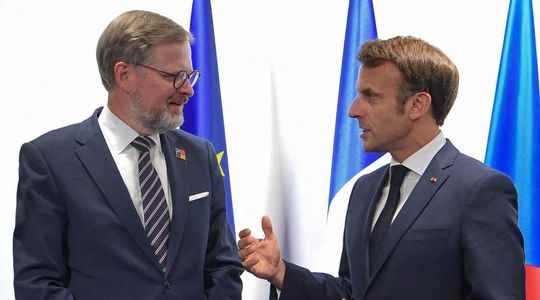The Czechs practice self-mockery. This is a big difference with the French, who passed on the torch of the presidency of the Council of the European Union to them. “The French arrived claiming that they were all going to break, they are playing it very modest. But, believe me, they will surprise you, they are very well prepared!”, Says a high-ranking European diplomat posted in Brussels .
The crises – the Covid, then the war in Ukraine – have hit the last rotating presidencies. Some therefore wonder if the Czech Republic, which is only on its second stint at the helm since joining the EU in 2004, will have the shoulders broad enough to face the period. “If we’re good at anything, it’s improvisation. We know how to be flexible,” says Eva Hrncirova, spokeswoman for the presidency. What if the Czechs surprised the skeptics?
Anti-Putin
First of all, they have the advantage of their geography: they take control while Central and Eastern Europe weighs more heavily on the European scene, because it alerted the Russians to the threat before the others and because the war is at its doorstep. The Czech government and people are viscerally anti-Putin. Prague strongly supports sanctions and provides financial and military assistance to Ukraine. Result: while some capitals were suspicious of France, the Czech Republic will not have to face suspicion when it speaks with its eastern neighbors about the many repercussions of the war.
“The Czechs like the role of bridge, this crisis can help them to play the intermediaries between the East and the block of the founding countries of the Union”, estimates a European source. Moreover, the country has already worked behind the scenes to help France to conclude in extremis, on the night of June 28 to 29, agreements on five texts of the Green Pact (in particular on the reform of the carbon market and the end of the heat engine in 2035). It also made it possible to prevent a chasm from developing between East and West.
Finally, only Poland voted against, dependence on coal obliges. During their semester, the Czechs have the ambition to conclude negotiations with the European Parliament on this colossal file. Fervent supporters of nuclear power, they also want to reduce the European Union’s energy dependence on Russian hydrocarbons.
Good relations with Poland
Petr Fiala’s Czech Republic has good relations with Mateusz Morawiecki’s Poland, which is often reluctant in European negotiations. The parties of the two prime ministers sit together in the eurosceptic group of European Conservatives and Reformists in the Parliament of Strasbourg. The two countries also host many Ukrainian refugees, 400,000 in the Czech Republic, more than three million in Poland. Warsaw’s welcoming policy has pushed criticism of the rule of law into the background, which suits the new presidency well and should prevent it from dealing with an embarrassing subject for it. Poland and the Czech Republic are also members of the Visegrad group, along with Slovakia and Hungary. But Viktor Orban’s positions on Russia and his illiberal drift have created differences between the four countries, which are less united than before. What give more autonomy to Prague.
Billionaire in the closet
Finally, a favorable coincidence of the calendar, the Czechs have since January a new more Europhile government and a more “standard” Prime Minister than his predecessor. The academic Petr Fiala replaced the cumbersome billionaire Andres Babis, suspected of corruption. “The Czech Republic has a card to play. Will the Prime Minister want to, when he has so far shown himself to be retiring on the European scene? asks Lukas Macek, associate researcher at the Institute Jacques Delors. The risk is an effective presidency in terms of organization, but politically transparent.” In any case, experience shows that the “small” countries often succeed in their European semester much as well as the “big ones”, to the point that Luxembourg is regularly cited as an example!
